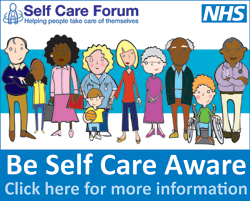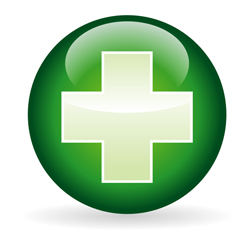Get the Right Treatment
Every year, millions of us visit our GP with minor health problems that can be easily resolved without a doctor's appointment.
It is estimated that every year, 50 million visits to the GP are made for minor ailments such as coughs and colds, mild eczema, and athlete's foot. By visiting your pharmacy instead, you could save yourself time and trouble.
Self-care
 Keeping a well stocked medicine cabinet at home can help you treat many minor ailments. Colds, coughs, indigestion and many other minor complaints can all be treated with medicines that are available over the counter.
Keeping a well stocked medicine cabinet at home can help you treat many minor ailments. Colds, coughs, indigestion and many other minor complaints can all be treated with medicines that are available over the counter.
Your pharmacist can advise on what you might find useful to keep in your medicine cabinet. Always follow the instructions on the medicine label and consult your doctor if the illness continues or becomes more severe.
Your Local Pharmacist
 Pharmacists offer professional free health advice at any time - you don't need an appointment. From coughs and colds to aches and pains, they can give you expert help on everyday illnesses. They can answer questions about prescribed and over-the-counter medicines. Your local Pharmacist can also advise on healthy eating.
Pharmacists offer professional free health advice at any time - you don't need an appointment. From coughs and colds to aches and pains, they can give you expert help on everyday illnesses. They can answer questions about prescribed and over-the-counter medicines. Your local Pharmacist can also advise on healthy eating.
Pharmacists can also advise on health eating, obesity and giving up smoking. Some pharmacists have private areas where you can talk in confidence. They may suggest you visit your GP for more serious symptoms. It is possible to purchase many medicines from the chemist without a prescription. Watch this short video on how you can get the most out of your local pharmacy
Walk in Centre
Due to the pandemic, the Walk-in Centre (WiC) based at the Integrated Care Centre (ICC) on New Radcliffe Street remains closed until further notice to protect patients, staff and public.
The ICC now houses a COVID Assessment Centre which is open 8am until 8pm 7 days a week and cares for patients with potential COVID-19 symptoms. It also houses a Digital Hub which provides support to Oldham Care Homes and provides urgent care (within 2 hours) to patients referred to the service by a health and social care professional. Both services are by appointment only following a referral from a healthcare professional or NHS111.
If we are unable to offer you an appointment but you require urgent medical attention, you should contact NHS111 and, depending on your situation you will:
- Find out what local service can help you
- Be connected to a nurse, emergency dentist, pharmacist or GP
- Get a face-to-face appointment if you need one
- Be given an arrival time if you need to go to A&E – this might mean you spend less time in A&E
- Be told how to get any medicine you need
- Get self-care advice
Accident & Emergency (A&E)
Major A&E departments assess and treat patients who have serious injuries or illnesses. Generally, you should visit A&E or call 999 for emergencies, such as:
- loss of consciousness,
- pain that is not relieved by simple analgesia,
- acute confused state,
- persistent, severe chest pain, or
- breathing difficulties.
If you're injured or seriously ill, you should go, or be taken, to A&E. If an ambulance is needed you can call 999, the emergency phone number in the UK. You can also dial 112, which is the equivalent for the European Union.
Major A&E departments offer access 365 days a year and usually open 24 hours a day. Be aware that not all hospitals have an A&E department.